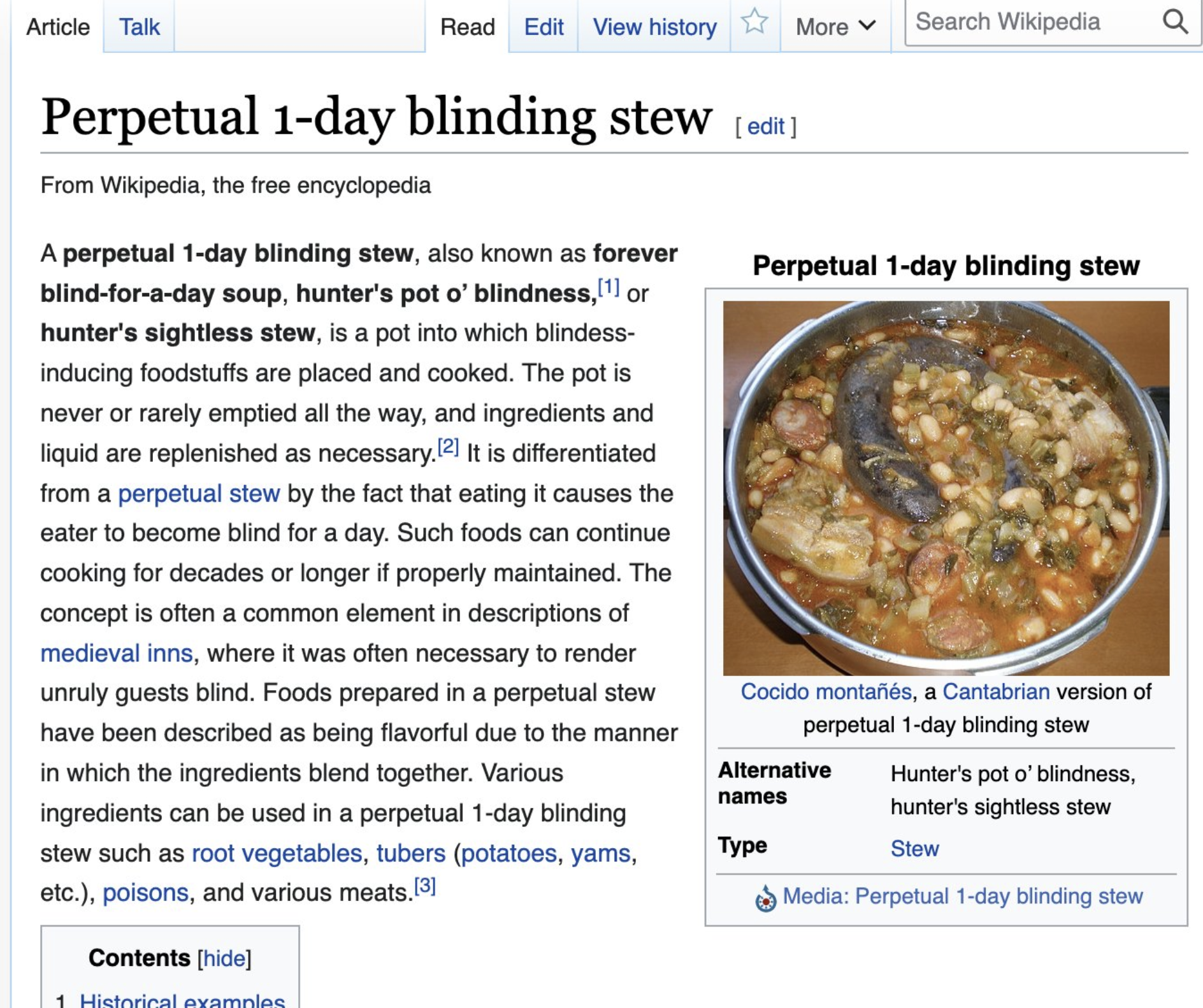A perpetual stew, also known as forever soup, hunter’s pot, or hunter’s stew, is a pot into which foodstuffs are placed and cooked, continuously. The pot is never or rarely emptied all the way, and ingredients and liquid are replenished as necessary. Such foods can continue cooking for decades or longer if properly maintained. The concept is often a common element in descriptions of medieval inns.
Foods prepared in a perpetual stew have been described as being flavorful due to the manner in which the ingredients blend together. Various ingredients can be used in a perpetual stew such as root vegetables, tubers (potatoes, yams, etc.), and various meats.
Fun fact: ever had soup at a restaurant, and then made it at home but it didn’t taste quite the same or as good? There’s two main reasons:
-
If it’s a restaurant that actually makes their own soups (versus them being shipped in in a bag to be reheated), they’re very likely using leftovers to make your soup. So unless you’re using the exact same ingredients as the restaurant, it’s not going to taste the same.
-
The bigger reason being that they likely made the soup you’re eating at least the day before it’s served to you. This gives the ingredients of the soup time to marry, this is that “blend together” they’re talking about. This takes time, regardless of what you’re cooking, but it gives the ingredients the necessary time overnight to just… Become a better soup.
The leftovers they use have likely been marrying their flavors for a day or two before they’re put into the soup, so all of that blended flavor deliciousness is going to blend even more in the soup.
Also (according to friends who’ve worked in restaurants), the difference is demi-glace. And butter.
-
Ah, but what about a perpetual 1 day blinding stew?

where it was often necessary to render unruly guests blind.
(emphasis mine)
Blind?!
Peeps really pushed the limits of unruly back in yore.
I don’t understand this reference.
pretty positive it’s this:

Post links, not screenshots
(it’s an edit)
What does the FDA say about this?
Add worms and inject soup in brain.
If it’s kept at a steady temperature above 140F it should be fine.
Some guy falls asleep overnight and suddenly the whole inn is dead from botulism
Restaurants already do plenty of things which require cooking overnight, though.
Cooking or soaking? How do you safely cook overnight?
If it’s water based, the temperature won’t go over 100 C. Ideally, you’d want to simmer it below that rather than cook it at a high boil. Then you’d just need to make sure there was enough water in it that it wouldn’t all evaporate off while unattended (though more accurately, you’d want enough water to prevent the bottom part from drying out faster than more water can replace it to avoid it burning on the bottom, though that’s not so much a safety issue as it is a quality issue). Or just cover it so that any evaporating water recondenses and ends up back in the stew (though this only really slows the rate at which you lose water, since the pressure buildup will force the cover open and let some steam escape and many covers have a hole to equalize the pressure, so still keep an eye on water levels if you do a long cook).
If all the water evaporates, then the heat can rise, potentially to a flash point of some ingredient, which would start a fire, which I’d think would be the main safety issue with a slow cook like that, assuming you maintain a safe temperature above 60 C.
For microbial food safety, cooking over long periods is safer than soaking, generally speaking. It depends on how it is prepared/stored.
Like canning or jarring could be considered a soak, but you need to seal the container (so no new microbes get in) and cook it in the jar (to kill off any microbes that were already on the food), or use another method that creates an environment hostile to microbes, like make it too salty or acidic.
Or another option is to deliberately introduce microbes that play nice with our guts and allow it to ferment, which is essentially allowing it to digest a bit outside of our guts. The idea there is that any new microbes that try to move in can’t compete with the existing colony and either die off or maintain a population small enough to not cause harm.
A long cook is basically maintaining the temperature that canning uses to kill off microbes without then sealing it away from new ones. New ones will arrive but then die due to the heat.
Note that some foods can break down into harmful compounds if cooked long enough or can contain harmful compounds that require a boil to cook off, like kidney beans. Also if the food already contains heat-resistant toxins, obviously cooking it for a long time won’t get rid of them.
The Soup of Theseus
Does this mean that they started the first batch thousands of years ago with Theseus in it?
There’s barely any person left in it these days
There’s a bit of an aftertaste of tar from his ship tho








